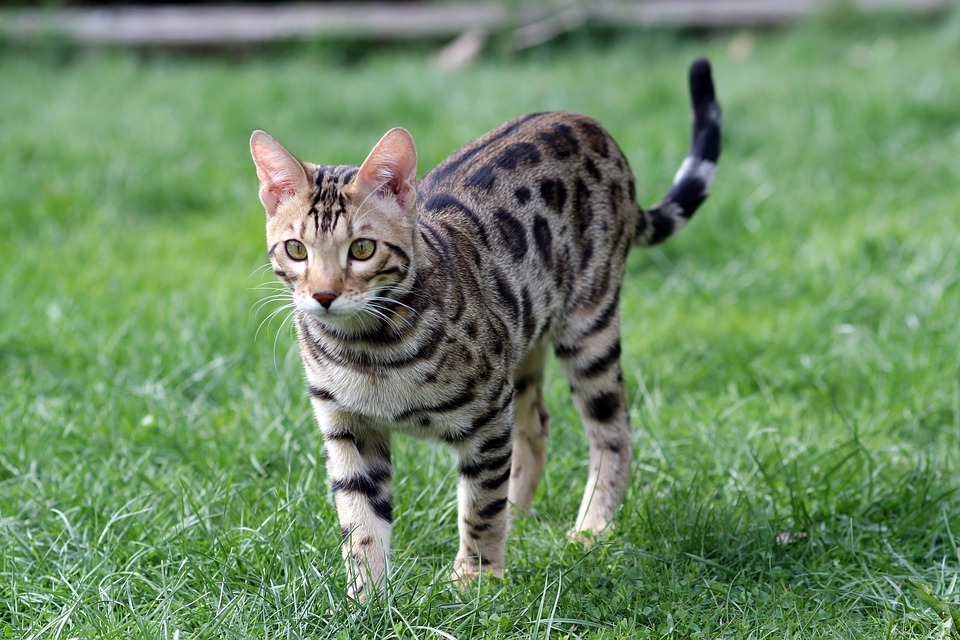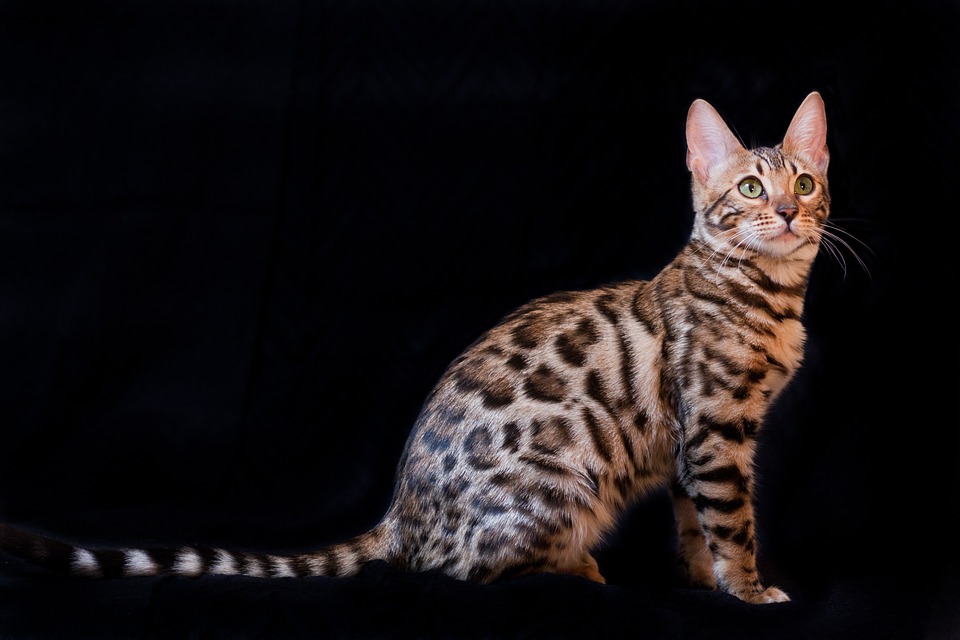
Bengal Cats are a popular and majestic feline breed. They are exotic and hybrids from Asian Leopard Cats and domestic cats. Bengal cats are large-boned, and shorthaired with spotted or marbled fur with several different colors. The information is this short Bengal Cat guide can give you all you need to know on these beautiful felines.
- Bengal Cat Height: 2.6 to 3.6 feet
- Bengal Cat Life Span: 10 to 16 years
- Other Names: Felis catus × Prionailurus bengalensis
- Bengal Cat Price: Kitten price on average is $800-$1,200 but depends on many factors like, the breeder, location, the cats gender, and the quality or markings of the cat.
Bengal Cat Basics
The Bengal Cat is a moderately new companion cat breed. The breed was achieved by cross breeding a domestic cat with an Asian Leopard Cat that was wild. Breeders were hoping to get the wild Asian Cat markings in a new tamed domestic kind of cat. Bengal Cats are usually medium sized, long, muscular and sleek, and come in several different patterns with different colors that look like small wild leopards.
Bengal Cats are exotic and playful, with the disposition of a loveable house cat, a sound temperament, little to no aggression, they are naturally inquisitive, and love to cuddle. They are affectionate and devote to all the household member in their home and can be great pets. The Bengal Cat has a varied range of vocal sounds and often communicates by unusual but attractive chirps, cooing, and trills.
Bengal Cat Temperament
Bengal Cats are active and social, so they are perfect for families that have children or cat-friendly dogs. They are very intelligent, highly active and learn tricks easily, interactive toys are a great way to keep your Bengal Cat out of trouble and give your pet a brain workout.
Bengal Cats are agile, affectionate, rambunctious, and energetic. Other small pets in the home may cause trouble for these Bengal Cats because they do have a high prey drive, so fish, rats, small rabbits and guinea pigs should be watched carefully.
Training a Bengal Cat should be somewhat easy considering these cats are extremely intelligent. To train your cat you will need to have patience, you may want to invest in a clicker, and some treats. Bengal Cats have been leash trained, harness trained, some have even been trained to fetch just like a dog would be.
Bengal Cat Price
The price of a Bengal kitten will vary on location, the breeder, the gender, and the quality. The generation of the Bengal Cat also plays a part in cost, F4 and above will be less expensive, F2 and F3 will cost you a little more, and an F1 generation will be the most expensive.
If you are considering an F1 female Bengal kitten, you may pay between $2,000 and $10,000, this amount depends on if the kitten is pet quality or is a show and breeding quality. Male F1 Bengal kittens may cost as much $1,500, these male kittens are all born sterile and that is why they are less expensive.
Bengal kittens in the F2 and F3 generations are usually priced according to their quality, markings, gender, females being more expensive than males. Theses generations of Bengal Cats can cost anywhere from $1,500 to $5,000.
Bengal Cat Pros and Cons
Pros
- Low tendency to vocalize
- Easy to groom
- Pet friendly
- Highly intelligent and trainable
- Affectionate with family
- Low amount of shedding
- Tolerate water, and may even go for a swim
Cons
- Extremely playful, full of mischief and energy
- Can be expensive to buy
- Can sometimes be challenging
- High prey drive
Bengal Cat Life Span

The average lifespan of a Bengal Cat is 10-16 years, but keep in mind that this is just a recorded average and some cats can live much longer. Environmental hazards can clip your Bengal Cats life short, so take care and keep them safe from unexpected deaths like being hit by cars.
Unvaccinated cats can die from Feline Immunodeficiency Virus, Feline Infectious Peritonitis, and Feline Leukemia Virus so make sure to get your Bengal Cat the proper vet care. Bengal Cats are naturally curious so they’re more likely to find their way into toxins that can harm and kill them.
Bengal Cat Health Issues and Genetic Problems
Bengal Cats are known to be commonly healthy, but they are not exempt from the normal health issues that can be genetic in nature. With that in mind, some of these diseases have been present in some Bengal Cats:
- Distal Neuropathy
- Flat-chested kitten syndrome
- Hip dysplasia
- Hypertrophic cardiomyopathy
- Patellar luxation
- Progressive retinal atrophy
- Heart Disease
- Eye Diseases
- Anesthetic Allergies
- Joint Problems
Bengal Cat Kittens
Bengal kittens are very expensive, and not very easy to come by. These Bengal cats are tremendously people oriented and absolutely love to be sprinkled with attention. If you are gone a lot for business or vacations and such, for long periods of time, a Bengal cat may not be suitable for you.
If you are still considering adopting or buying this exotic cat, it is recommended that you opt for two Bengal kittens so that they can keep each other company while you are away. When you think of a Bengal kitten, you should think of the phrase “all or nothing”.
Bengal kitten can be a great pet for children because of their high energy and endurance. When you bring a new kitten into your home with children, it is recommended that you teach your kids how to treat animals with care and respect, especially with Bengal cats because these animals are intelligent and have been said to hold a grudge with someone who has treated them poorly.
Bengal Cat Rescue
If you would like to adopt a Bengal Cat, you could search your local APL or rescue centers for a Bengal Cat, but the odds of finding one are rare. These cats are a popular breed, but you can find them in a shelter on occasion, some rescue non-profit groups that focus on this unusual breed is the Bengal Rescue Network (BRN), and Great Lakes Bengal Rescue.
The BRN is a non-profit organization, with volunteers all over the U.S and Canada. Great Lakes is a non-profit organization determined to rescue and find forever homes for Bengal Cats, and Bengal mixes, in Illinois, Iowa, Michigan, Ohio, Minnesota, Kentucky, Indiana, Tennessee, and Wisconsin.